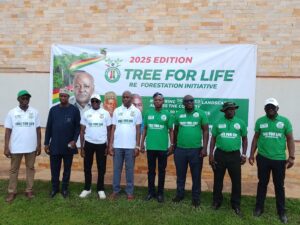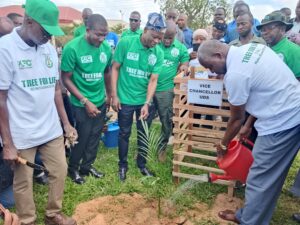By Samuel SAM
The Northern Regional office of the Forestry Commission has distributed over one million tree seedlings across schools, organisations and communities as part of the “Tree for Life” reforestation initiative, aimed at combating climate change and restoring degraded ecosystems.
The initiative aligns with the government’s broader objective of planting 30 million trees nationwide, particularly in areas heavily impacted by deforestation, illegal mining (galamsey), and environmental degradation—factors that continue to affect livelihoods, agriculture and water sources.

The tree-planting exercise, launched at the University for Development Studies (UDS), brought together security agencies, government officials, traditional authorities, school representatives, and staff of the Forestry Commission. Seedlings were planted across the UDS campus and surrounding areas to symbolise the beginning of a long-term restoration project.
Speaking at the launch, Northern Regional Minister, Ali Adolf John Mbrudiba, underscored the urgent need for sustained afforestation efforts. “Tree planting is a critical tool in our fight against climate change. Beyond providing fruits and seeds, trees protect our environment, fight desertification and support food security. We must all adopt the culture of planting and nurturing trees,” he said.
He noted that galamsey activities had caused significant ecological damage, stressing the importance of replanting in those affected zones. “If in the next decade we fail to prioritise reforestation, we risk turning our lands into deserts. We must take collective responsibility to ensure the survival of every tree we plant,” he added.

He further challenged the region to surpass its target of one million trees, aiming instead for two million this year alone. “This effort must not be a one-time event but a continuous commitment,” he stated.
Vice-Chancellor of UDS, Prof. Seidu Al-Hassan, pledged the university’s commitment to sustaining the initiative, announcing that every student participating in the Third Trimester Field Practical Programme (TTFPP) would be required to plant and nurture at least one tree in their assigned community.
Regional Director of the Forestry Commission, Atuahene Nyarko, highlighted the importance of community participation in safeguarding the environment. “Our focus is on reclaiming lands destroyed by galamsey and other human activities. This initiative also seeks to instil a culture of environmental stewardship in the youth,” he said.
He appealed to corporate bodies, educational institutions, and the public to support the effort by collecting free seedlings from Forestry Commission offices and engaging actively in the reforestation process.
Mr. Nyarko also called on residents to act as custodians of the newly planted trees to ensure their survival and long-term environmental impact.










